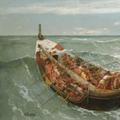Cyclops Pars Tertia
Cyclops Teil drei
Cyclops Part Three
Ciclope parte terza
Cyclopen deel drie
Ciclope Parte Três
Pars Tertia
part III
prima luce Polyphemus caecus speluncam aperuit et oves liberavit.
the first light, he opened the cave of Polyphemus, a blind man, and the sheep of the free.
iratissimus erat.
angry.
homines igitur in terga ovium diligenter quaerebat.
So back to the sheep diligently seeking.
Ulixes tamen consilium callidum cepit.
Ulysses still had a clever plan.
comites se celare sub ovibus iussit.
he ordered his companions to hide himself under the sheep.
Polyphemus in exitu speluncae stabat sed Ulixem comitesque invenire non poterat quod sub ovibus celati erant.
But a Ulysses in Polyphemus, who in the end of the of the cave, stood largely concealed beneath the sheep, and his suite were to find that it was not able to.
ubi ex spelunca effugerunt Ulixes comitesque ad navem cucurrerunt et navem celeriter conscenderunt.
the ship of Ulysses and his suite to the ship, ran up, and when he discovered from the cave of the escaped of you out quickly detected.
dum tamen ab insula navigabant, Ulixes magna cum voce clamavit, “Cyclops, comites meos consumpsisti sed nunc Iuppiter te punivit!”
While still on the island sailed Ulysses large with a loud voice, "Cyclops consumed my companions punished, but now on you!"
ubi hoc audivit, Polyphemus ad litus festinavit et saxa in navem iecit.
When he heard the blinded to the beach quickly got into the boat rocks shot.
“cur hoc facis?” comites Ulixi inquiunt, “gigas navem paene delevit!”
"Why are you doing this?" Ulysses companions say, the "giant ship almost deleted!"
sed ille iratissimus erat.
but he was very angry.
“ego Ulixes te fefelli, Polypheme” clamabat.
"I fail to Ulysses, Polyphemus," called out.
ubi hoc audivit, Polyphemus patrem Neptunum rogavit ut Ulixem puniret.
When he heard the blinded father Poseidon asked to punish Ulysses.
saxum ingens a monte rapuit et summa vi in navem iecit.
Mount abducted from a huge sum of force shot on the board.
Ulixes tamen tutus ab insula Cyclopum navigavit.
Odysseus, however, sailed safely from the island of the Cyclopes.

